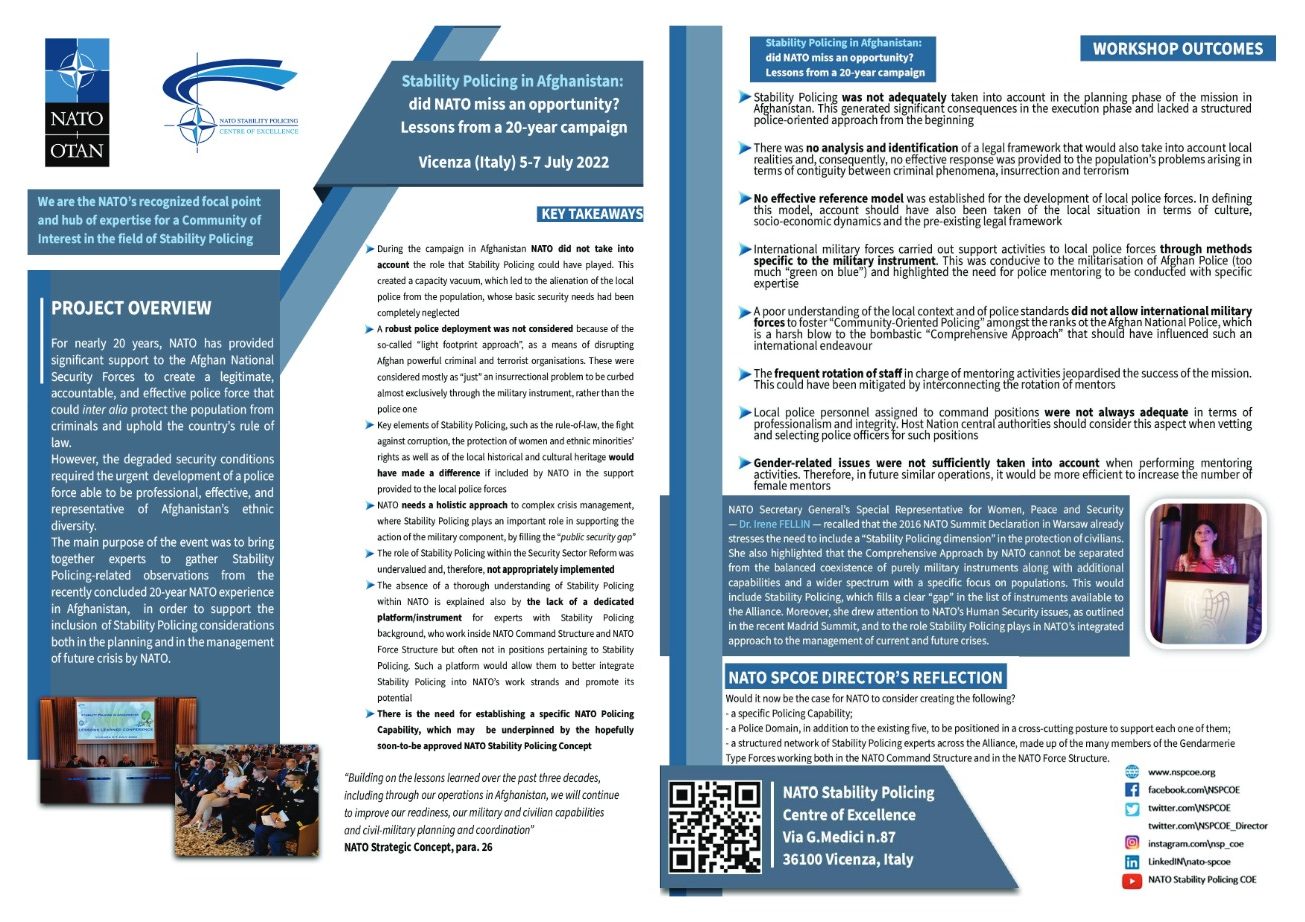NATO SP CoE Lessons Learned Conference: “Stability Policing in Afghanistan: did NATO miss an opportunity? Lessons from a 20-year campaign”.

From 5 to 7 July 2022 the NATO Stability Policing Centre of Excellence, under NATO ACT’s aegis carried the Conference – “Stability Policing in Afghanistan: did NATO miss an opportunity? Lessons from a 20-year campaign”.
Prior to the Conference a two-day workshop was held to set the scene and provide the foundation to the ensuing discussion through three thematic syndicates that analysed the subject matter from a strategic, operational and tactical perspective.
The relevant outcomes were then presented on 7 July to the larger audience of the symposium and to the authorities in attendance (chiefly, Lt. Gen. Maurizio Detalmo Mezzavilla, Carabinieri Deputy Commander, and Ms. Irene Fellìn, NATO Secretary General’s Special Representative for Women, Peace and Security).
Amongst the most important takeaways, it was acknowledged the following:
- During the campaign in Afghanistan the Alliance and the International Community did not take into account the role that Stability Policing (SP) could have played in filling the “public security gap” between local institutions and the Afghan population;
- This created a capacitive vacuum, which alienated Afghan National Police and local institutions from the populace, whose basic security needs have been completely neglected;
- The lack of their legitimacy may be considered as one of the key factors that led in August 2021 to the fall of Afghanistan into the hands of the Taliban over the course of less than two weeks;
- Since 2001, a robust police approach has not been considered, neglecting destabilising phenomena of a strong criminal nature and addressing the terrorist threat as an insurrectional problem, to be combated almost exclusively through the military instrument, rather than also using the police instrument;
- The gap between the military and the civilian components of international intervention in Afghanistan could have been successfully bridged by SP, thus ensuring the inclusion of a police dimension into military operations;
- Inter alia, key SP-related pivoting factors that would have made the difference in Afghanistan would have been the following but not limited to: a structured and robust legal framework; the fight against corruption; the protection of ethnic minorities, cultural heritage and women’s rights. NATO SP does indeed include such tasks within its core mission aimed at reinforcing and/or replacing local police forces in fragile states;
- NATO’s 360° Comprehensive Approach to complex crisis management and to the Security Sector Reform is to include SP crucial role.
In her keynote speech Ms. Fellìn:
- Acknowledged SP as a primary instrument for the Alliance aimed at supporting the maintenance of public order and security in crisis areas;
- Recalled that the 2016 NATO Warsaw Summit Declaration already stresses the need to include an “SP dimension” in the protection of civilians;
- Highlighted that NATO’s Comprehensive Approach is to strike a balance between the purely Military Instrument of Power and additional capabilities aimed at addressing a wider spectrum of challenges specifically focused on populations, including SP, which – in her words – fills a clear capability “gap” in the Alliance’s toolbox;
- Echoing the recent Madrid Summit, underlined the importance of NATO’s Human Security topics, lately fully incorporated into the new Strategic Concept, praising the role SP can play in this remit, with a keen eye on the continuously evolving conflict in Ukraine.
A final report of the event will be finalized as soon as practicable.
NSPCoE trusts that the findings of this three-day event will support ACT, the Alliance and the International Community as a whole decision-making, not to repeat the mistakes made during the 20-year campaign in Afghanistan.